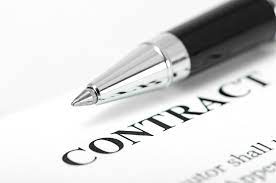Conveyancing is the legal process required when buying and selling property, as well as other property transactions such as remortgaging.
In the majority of transactions you will instruct a conveyancing solicitor. The Law Society has a list of accredited solicitors. Some people feel more comfortable having a solicitor local to them, but as most of the work is done online and via post, if a friend highly recommends a firm in Birmingham and you live in Guildford, you do not necessarily have to only look for conveyancing solicitors in Guildford.
The Contract Pack
Once an offer has been accepted on a property, the sale process can begin. The vendor’s solicitor will draft a contract pack, outlining full details of the property and a draft contract of sale. This draft contract will give comprehensive details of everything included in the sale and should be reviewed thoroughly by both the buyer’s solicitor and the buyer themselves.

Pre-Contract Enquiries
Reviewing the draft contract of sale will likely bring up some queries needing clarification, such as what fixtures and fittings are included or not. The solicitors on both sides can negotiate and it’s important that the sale moves forward only when the full details are hashed out and agreed.
Property Searches and Checks
Various property searches could and should be carried out on the property, such as Environmental Agency checks, planning and council searches. This process can be long and you will need to be patient. The buyer’s solicitor will also need to carry out money laundering checks on the buyer. This is also the stage where any surveys are carried out. Your lender will do their own survey, but in most cases, it’s wise to do your own as well. There are various types of survey right up to full structural. Firms such as Sam Conveyancing can offer advice on this if you are unsure.
Exchange
Once all the checks, searches and surveys have been completed and any issues raised, the final contract of sale can be agreed and signed by both parties. This is the point at which the sale becomes legally binding; at any point before exchange either party can pull out of the sale without penalty.
Completion
Once each solicitor receives the signed copy of the contract of sale from the other party, a completion date will need to be agreed upon. This is the date that funds are released, money is exchanged, and the buyer legally takes possession of the property. The solicitor acting for the buyer will inform them of the outstanding amount to pay, arrange the funds transfer and organise transferring the title deeds with the Land Registry.
How Long Will It Take?
Typically the conveyancing process can take eight to twelve weeks, however, this does depend on the complexity of the transaction, issues raised during searches or surveys leading to further negotiation, and also how many people are in the chain. The process can only move as quickly as the slowest person in the whole chain, as delays from one party prevent everyone from moving forward.
How Much Will It Cost?
Again, this can vary depending on many factors, but buyers can expect to pay anything from £300 to £1500 for conveyancing, plus disbursements. Whilst you can do it yourself in an effort to reduce costs, there is a lot of legal paperwork and technical language involved, and mistakes made due to inexperience can be costly, so this can be a false economy.

Conveyancing is a legal requirement during a property transaction, and while it can be long and stressful, an experienced solicitor can streamline the process.






